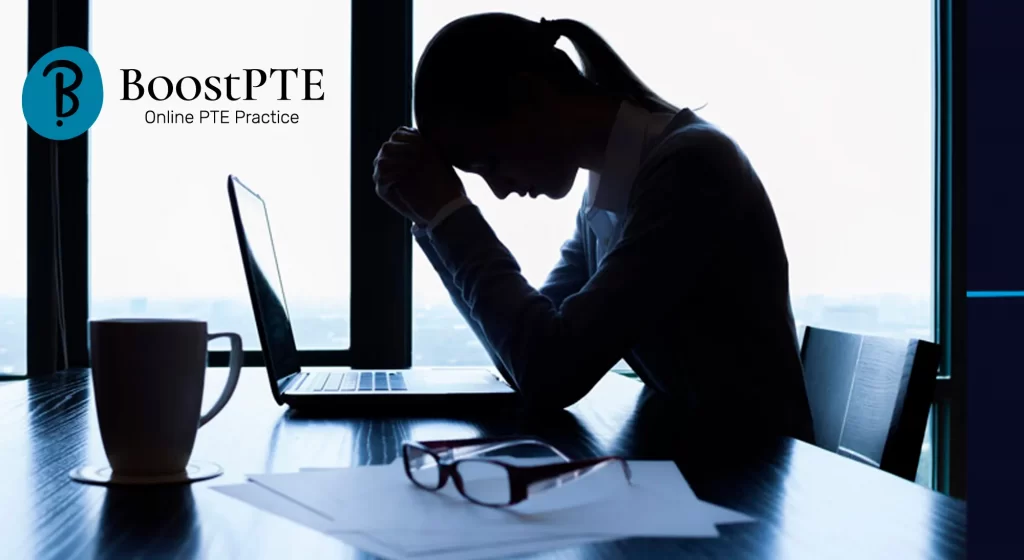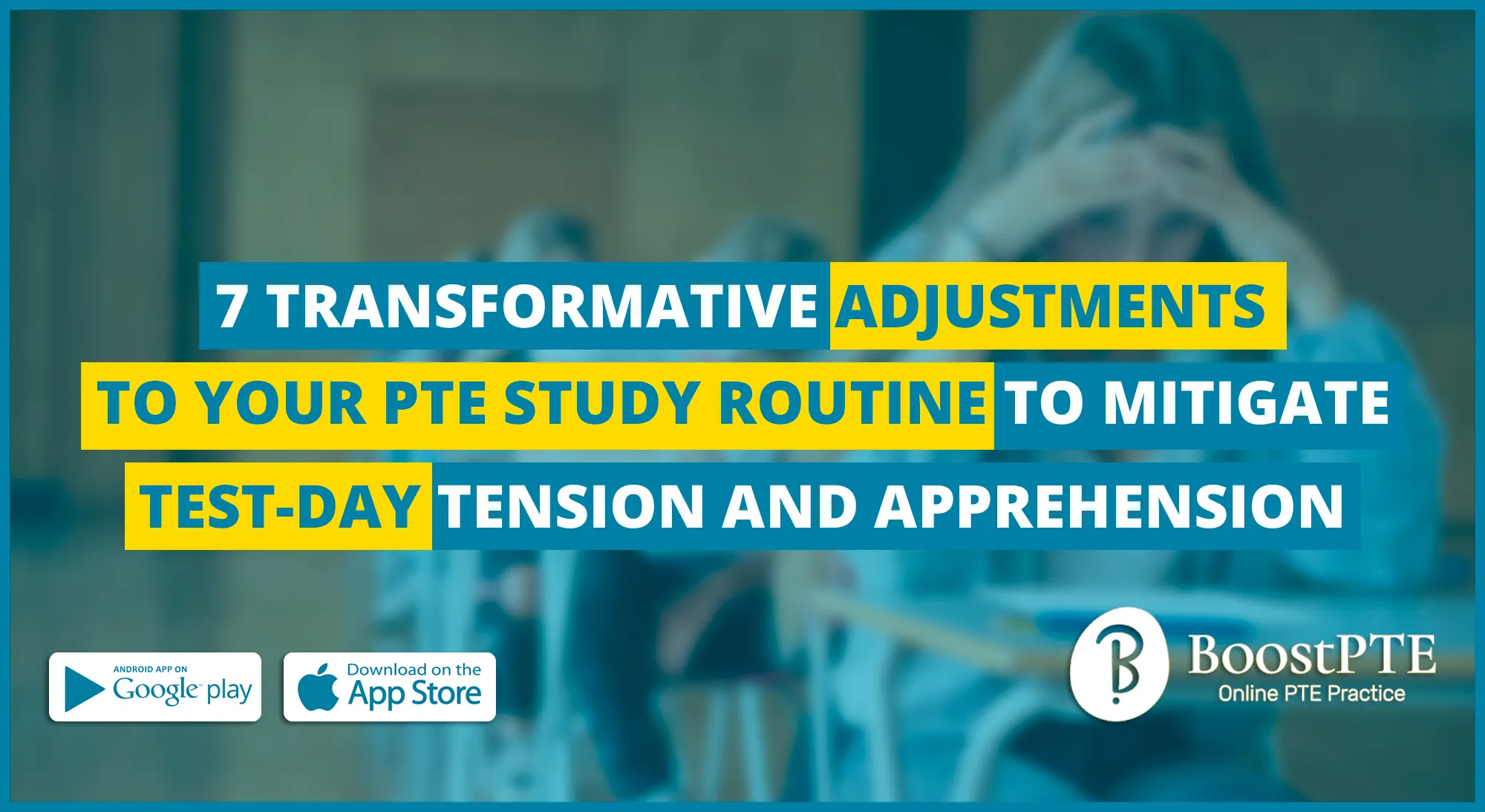Embarking on the journey to ace the PTE exam can often be stressful and anxiety-inducing. This blog post aims to alleviate these concerns by providing you with seven transformative adjustments to your PTE study routine. These changes are designed to help you navigate the high-stakes environment of the PTE exam with confidence and ease. Let’s dive in and explore these strategies to ensure your success on test day.
Introduction
Embarking on the journey to ace the PTE exam can often be stressful and anxiety-inducing. This blog post aims to alleviate these concerns by providing you with transformative adjustments to your PTE study routine.
Understanding the PTE Exam Day Stress’
The Pearson Test of English (PTE) Academic is a high-stakes English language proficiency test that requires rigorous preparation. The pressure to perform well can lead to stress, especially as the exam day approaches. This stress is not merely due to the challenging nature of the PTE test format but also because of the significant implications of the test results. These results often determine eligibility for study abroad programs, immigration, and professional opportunities in English-speaking countries.

Stress can manifest in various ways, such as difficulty concentrating, feeling overwhelmed, and physical symptoms like headaches or a racing heart. It’s essential to acknowledge this stress as a normal part of the high-stakes testing process. However, it’s equally crucial to develop strategies to manage this stress effectively to ensure it doesn’t hinder your performance on the exam day.
The Impact of Stress and Anxiety on PTE Score
Stress and anxiety can significantly impact your PTE score. When you’re anxious, your cognitive functions, particularly your reading and speaking skills, can be affected. Anxiety can cause your mind to go blank, make it difficult for you to understand questions, or lead to mistakes due to hurried responses. Furthermore, stress can affect your voice, leading to less clear speech during the speaking section of the exam.
It’s important to note that stress and anxiety don’t just appear on the exam day. They can build up during your PTE study period, especially if you’re not adequately prepared. Therefore, it’s crucial to incorporate stress management techniques into your PTE study routine well ahead of the exam day.
In the following sections, we will explore seven transformative adjustments you can make to your PTE study routine to mitigate test-day tension and apprehension. These changes are designed to help you navigate the high-stakes environment of the PTE exam with confidence and ease.
The Need for Changes in PTE Study
Preparing for the PTE exam is not just about studying hard; it’s about studying smart. This involves strategically changing your PTE study routine to manage stress and anxiety effectively. Let’s delve into why these changes are necessary and what they entail.
The Importance of Early Changes in PTE Study
Stress and anxiety don’t just appear out of nowhere on the exam day. They build up over time, especially if you’re not adequately prepared. Therefore, it’s crucial to start making changes to your PTE study routine well ahead of the exam day. Starting early gives you ample time to understand the PTE test format, identify your weak areas, and devise a study plan. It also allows you to develop strong study habits and gradually build up your endurance for the 3-hour long exam.
The Role of Stress and Anxiety in PTE Exam Performance
Stress and anxiety can significantly impact your performance on the PTE exam. When you’re anxious, your cognitive functions can be affected, leading to mistakes and lower scores. Moreover, stress can affect your voice, leading to less clear speech during the speaking section of the exam. By making early changes to your PTE study routine, you can learn to manage your stress and anxiety effectively, thereby improving your performance on the exam.
7 Changes to Avoid Stress and Anxiety on the PTE Test Day
Now that we understand the importance of making changes to your PTE study routine let’s explore the seven transformative adjustments you can make. These changes are designed to help you manage stress and anxiety effectively, thereby improving your performance on the PTE exam. They include starting early, making notes, improving your endurance, practicing at tough times, practicing anxiety avoidance, practicing breathing exercises, and maintaining proper sleep and nutrition.
In the following sections, we will delve deeper into each of these changes, providing practical tips and strategies to incorporate them into your PTE study routine.
Start Early
One of the most effective strategies to manage stress and anxiety for the PTE exam is to start your preparation early. This approach has several benefits, including giving you ample time to understand the PTE test format, identify your weak areas, and devise a study plan.

The Importance of Time in PTE Preparation
Time is a crucial factor in PTE preparation. The PTE exam assesses your English language proficiency across four skills – listening, reading, speaking, and writing. Each of these skills requires dedicated practice and improvement over time. Starting your preparation early gives you the luxury of time to gradually build up your skills, rather than cramming at the last minute. It allows you to learn quickly, reducing the pressure and stress associated with last-minute preparation.
The Benefits of Starting Early
Starting your PTE study early has several benefits. Firstly, it allows you to familiarize yourself with the PTE test format. Understanding the format can significantly reduce your anxiety as you know what to expect on the test day. Secondly, it gives you time to identify your weak areas. By taking a mock test at the beginning of your preparation, you can understand which skills you need to focus on. Lastly, starting early gives you time to devise a proper study plan and develop strong study habits. A well-structured study plan ensures that you cover all areas of the test and not just focus on your weak points. It also ensures that you have enough practice under timed conditions, which is crucial for managing time during the actual exam.
In the following sections, we will delve deeper into each of these benefits and provide practical tips on how to start your PTE study early.
Make Notes
Note-taking is a powerful tool in your PTE study arsenal. It helps you keep track of your learning progress, remember important points, and reduce test-day stress. Let’s delve into the role of note-taking in PTE preparation and how it can help you manage stress.
The Role of Note-Taking in PTE Preparation
Note-taking plays a crucial role in PTE preparation. When you’re studying for the PTE exam, you’ll likely come across a wealth of information. It can be challenging to remember all the important points, especially when you’re dealing with different skills like listening, reading, speaking, and writing. This is where note-taking comes in.
By jotting down key points during your study sessions, you create a personal reference that you can revisit anytime. These notes can include anything from important concepts, common mistakes, and useful strategies to new vocabulary words. They serve as a condensed version of your study materials, making revision more efficient and effective.
How Note-Taking Reduces Test Day Stress
Note-taking can significantly reduce test-day stress. Having a set of notes means you have a reliable source of information to review before the exam. This can boost your confidence and reduce anxiety about forgetting important points.
Moreover, the act of note-taking itself can be therapeutic. It encourages mindfulness as you focus on the information at hand rather than worrying about the future exam. It also gives you a sense of control over your study, which can alleviate feelings of stress and anxiety.
In the following sections, we will provide practical tips on incorporating note-taking into your PTE study routine.
Practice at Tough Times
Preparing for the PTE exam is not just about the quantity of your study hours but also about the quality of your practice sessions. One effective strategy to enhance the quality of your practice is to train during challenging times. Let’s delve into why this is important and how it can improve your performance.
The Importance of Practicing Under Difficult Conditions
On the PTE Test Day, you never know what you might be feeling, and you might not want to take the exam. You might be feeling mentally fatigued. And that’s when you underperform. To avoid this situation, you need to practice when you don’t feel like it. For instance, practicing after having dinner or waking up in the morning and practicing a task like essay writing.
Practicing under difficult conditions can help you build resilience and adaptability, two crucial traits for performing well under the high-pressure environment of the PTE exam. It trains you to stay focused and maintain your performance level even when you’re not feeling your best. This can be particularly beneficial for managing unexpected situations on exam day, such as feeling unwell or dealing with distracting test conditions.
How Practicing at Tough Times Improves Performance
Practicing at tough times can significantly improve your performance on the PTE exam. When you train under challenging conditions, you learn to push through discomfort and maintain your focus. This can enhance your mental stamina, allowing you to stay sharp and perform well throughout the 3-hour long exam.
Moreover, practicing at tough times can help you develop effective coping strategies for managing stress and anxiety. It can teach you how to calm your mind, regain your focus, and get back on track after a setback. These skills are invaluable for managing the ups and downs of the PTE exam and achieving a high score.
In the following sections, we will provide practical tips on incorporating practice at tough times into your PTE study routine.
Practice Anxiety Avoidance
Anxiety can significantly impact your performance on the PTE exam. Therefore, it’s crucial to incorporate anxiety avoidance techniques into your PTE study routine. Let’s delve into how meditation and relaxation exercises can help in PTE preparation and the impact of anxiety on PTE exam performance.
The Role of Meditation and Relaxation Exercises in PTE Preparation
Meditation and relaxation exercises play a vital role in managing anxiety during PTE preparation. Regularly practicing these techniques can help you calm your mind, improve your focus, and enhance your mental resilience. This can be particularly beneficial for managing the high-pressure environment of the PTE exam.
Meditation exercises, such as mindfulness meditation or guided imagery, can help you stay present and focused during your study sessions. They can also help you manage stress and anxiety by promoting relaxation and mental clarity.
The Impact of Anxiety on PTE Exam Performance
Anxiety can have a significant impact on your PTE exam performance. When you’re anxious, your cognitive functions can be affected, leading to mistakes and lower scores. Moreover, anxiety can affect your voice, leading to less clear speech during the speaking section of the exam.
By practicing anxiety avoidance techniques, you can learn to manage your anxiety effectively, thereby improving your performance on the PTE exam.
Practice Breathing
Breathing exercises are another effective tool for managing stress and anxiety during PTE preparation. Let’s explore the importance of these exercises and how they can improve your focus and calmness.
The Importance of Breathing Exercises in PTE Preparation
Breathing exercises, such as deep breathing or box breathing, can help you manage stress and anxiety during your PTE study sessions. These exercises promote relaxation, improve focus, and enhance mental clarity. They can be particularly beneficial for managing the high-pressure environment of the PTE exam.
How Breathing Exercises Improve Focus and Calmness
Breathing exercises can significantly improve your focus and calmness during the PTE exam. By focusing on your breath, you can divert your attention away from stressors and bring your mind back to the present moment. This can help you stay calm and focused during the exam, thereby improving your performance.
In the following sections, we will provide practical tips on incorporating breathing exercises into your PTE study routine.
Sleep and Nourishment
While studying for the PTE exam, it’s easy to overlook the importance of basic self-care habits like getting enough sleep and maintaining a proper diet. However, these factors play a crucial role in your overall performance and ability to manage stress and anxiety. Let’s delve into the role of good sleep and proper diet in PTE preparation and how they affect PTE exam performance.

The Role of Good Sleep and Proper Diet in PTE Preparation
Good sleep and proper nutrition are essential for optimal cognitive function. Sleep is crucial for memory consolidation, which is the process of transferring new information from short-term to long-term memory. A good night’s sleep can enhance your ability to remember and recall the information you studied during the day.
Similarly, a balanced diet provides the necessary nutrients for your brain to function properly. Eating regular, nutritious meals can help maintain your energy levels, improve concentration, and reduce feelings of stress and anxiety.
How Sleep and Nourishment Affect PTE Exam Performance
Lack of sleep and poor nutrition can negatively impact your performance on the PTE exam. Sleep deprivation can lead to fatigue, reduced concentration, and impaired memory, all of which can affect your ability to perform well on the exam. Similarly, skipping meals or eating unhealthy food can lead to fluctuations in blood sugar levels, causing mood swings, difficulty concentrating, and reduced energy levels.
By maintaining good sleep and eating habits, you can ensure that you’re physically and mentally prepared for the PTE exam.
Tips to Follow During the Exam to Avoid Stress and Anxiety

Managing stress and anxiety doesn’t stop at the preparation stage; it continues even during the exam itself. Here are some strategies to help you handle stress and anxiety during the exam and maintain your focus.
Strategies for Handling Stress and Anxiety During the Exam
If you find yourself feeling stressed or anxious during the exam, take a moment to pause and breathe. Deep breathing can help calm your mind and body, allowing you to regain your focus. Remember, it’s okay to take short breaks if you need to.
Another effective strategy is to maintain a positive mindset. Remind yourself of your preparation and the hard work you’ve put into studying for the exam. Trust in your abilities and stay confident.
The Importance of Staying Focused During the Exam
Staying focused during the exam is crucial for achieving a high score. Avoid distractions and stay present in the moment. If you find your mind wandering, gently bring your focus back to the task at hand. Remember, the key to a successful exam performance is a combination of good preparation, effective stress management, and a focused mind.
Conclusion
As we reach the end of this guide, let’s reflect on the importance of good preparation and professional guidance in achieving a high PTE score.
The Role of Good Preparation in PTE Exam Performance
Good preparation is the cornerstone of a successful PTE exam performance. It involves not just understanding the test format and practicing the skills but also managing stress and anxiety effectively. By incorporating the seven changes discussed in this guide into your PTE study routine, you can ensure that you’re well-prepared for the exam, both academically and emotionally.
The Importance of Professional Guidance in PTE Preparation
Professional guidance can provide valuable insights and strategies to enhance your PTE preparation. It can help you identify your weak areas, devise an effective study plan, and provide feedback on your performance. Moreover, professional guidance can provide you with the necessary tools and techniques to manage stress and anxiety effectively, thereby improving your overall performance on the PTE exam.
Summary
Let’s recap the key points discussed in this guide.
Recap of the 7 Changes to Avoid Stress and Anxiety on the PTE Test Day
We discussed seven transformative adjustments to your PTE study routine to mitigate test-day tension and apprehension. These changes include starting early, making notes, improving your endurance, practicing at tough times, practicing anxiety avoidance, practicing breathing exercises, and maintaining proper sleep and nutrition. Incorporating these changes into your PTE study routine can help you manage stress and anxiety effectively, thereby improving your performance on the PTE exam.
The Importance of These Changes in Achieving a High PTE Score
These changes are not just about reducing stress and anxiety; they’re about enhancing your overall PTE preparation. By starting early, you can understand the test format and identify your weak areas. Making notes can help you remember important points while improving your endurance can prepare you for the 3-hour long exam. Practicing at tough times can build resilience while practicing anxiety avoidance and breathing exercises can help you manage stress and anxiety. Lastly, maintaining good sleep and eating habits can ensure that you’re physically and mentally prepared for the exam. All these changes play a crucial role in achieving a high PTE score.
Frequently Asked Questions (FAQs)
What is the PTE Exam, and Why is it Stressful?
The Pearson Test of English (PTE) Academic is a high-stakes English language proficiency test that assesses your listening, reading, speaking, and writing skills. The test is often a requirement for study abroad programs, immigration, and professional opportunities in English-speaking countries. The high stakes associated with the test results can make it a stressful experience. However, with proper preparation and stress management techniques, you can effectively handle this stress.
How Can I Improve My PTE Study Habits to Reduce Stress?
Improving your PTE study habits can significantly reduce stress. Start your preparation early, make notes during your study sessions, and practice under timed conditions to mimic the actual exam environment. Also, incorporate stress management techniques into your study routine, such as practicing anxiety avoidance and breathing exercises. Lastly, maintain good sleep and eating habits to ensure that you’re physically and mentally prepared for the exam.
What are Some Effective Strategies for Handling Stress and Anxiety During the PTE Exam?
There are several strategies to handle stress and anxiety during the PTE exam. Practice deep breathing exercises to calm your mind and body. Maintain a positive mindset and remind yourself of your preparation and the hard work you’ve put into studying for the exam. If you find yourself feeling stressed or anxious during the exam, take a moment to pause and regain your focus. Remember, it’s okay to take short breaks if you need to.
How Can Professional Guidance Help in PTE Preparation?
Professional guidance can provide valuable insights and strategies to enhance your PTE preparation. It can help you identify your weak areas, devise an effective study plan, and provide feedback on your performance. Moreover, professional guidance can provide you with the necessary tools and techniques to manage stress and anxiety effectively, thereby improving your overall performance on the PTE exam.



 (3,529 votes, average: 9.24 out of 10)
(3,529 votes, average: 9.24 out of 10)



